Analysis of Theories, Principles, and Models in Education & Training
VerifiedAdded on 2022/11/28
|15
|4946
|81
Report
AI Summary
This report provides a comprehensive analysis of various theories, principles, and models relevant to education and training. It begins by exploring learning theories such as behaviorism, cognitivism, connectivism, and social learning, and discusses their application in teaching, learning, and assessment. The report further examines different learning preferences and how to incorporate them for inclusive teaching. It also delves into communication models, including the Shannon and Weaver model and the transactional model, and their application in educational settings. The report then analyzes assessment theories, curriculum development models, and theories of reflection and evaluation, explaining how these models can be applied to enhance curricula and review teaching practices. The report provides valuable insights into how educators and trainers can improve their practice and create more effective learning environments.
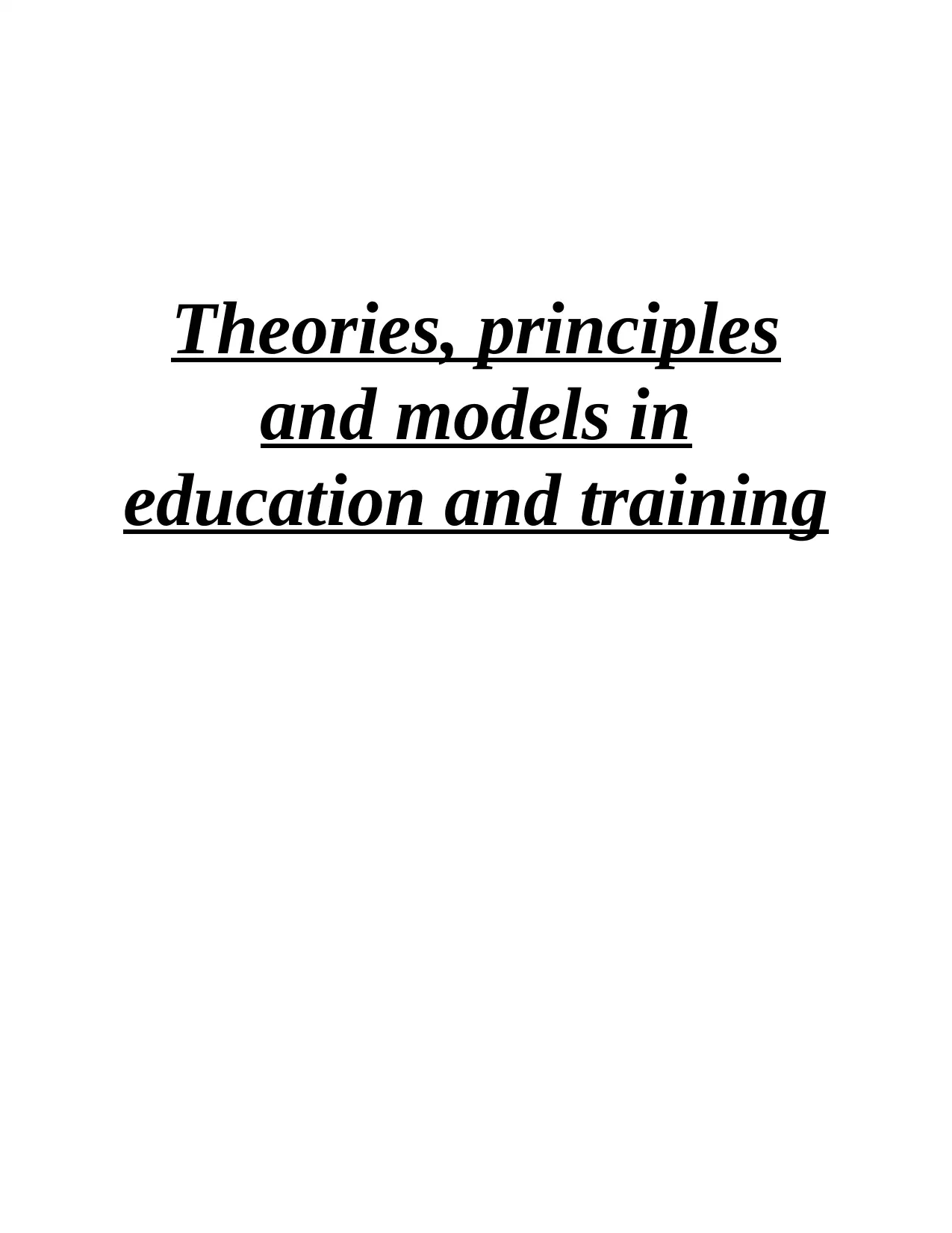
Theories, principles
and models in
education and training
and models in
education and training
Paraphrase This Document
Need a fresh take? Get an instant paraphrase of this document with our AI Paraphraser
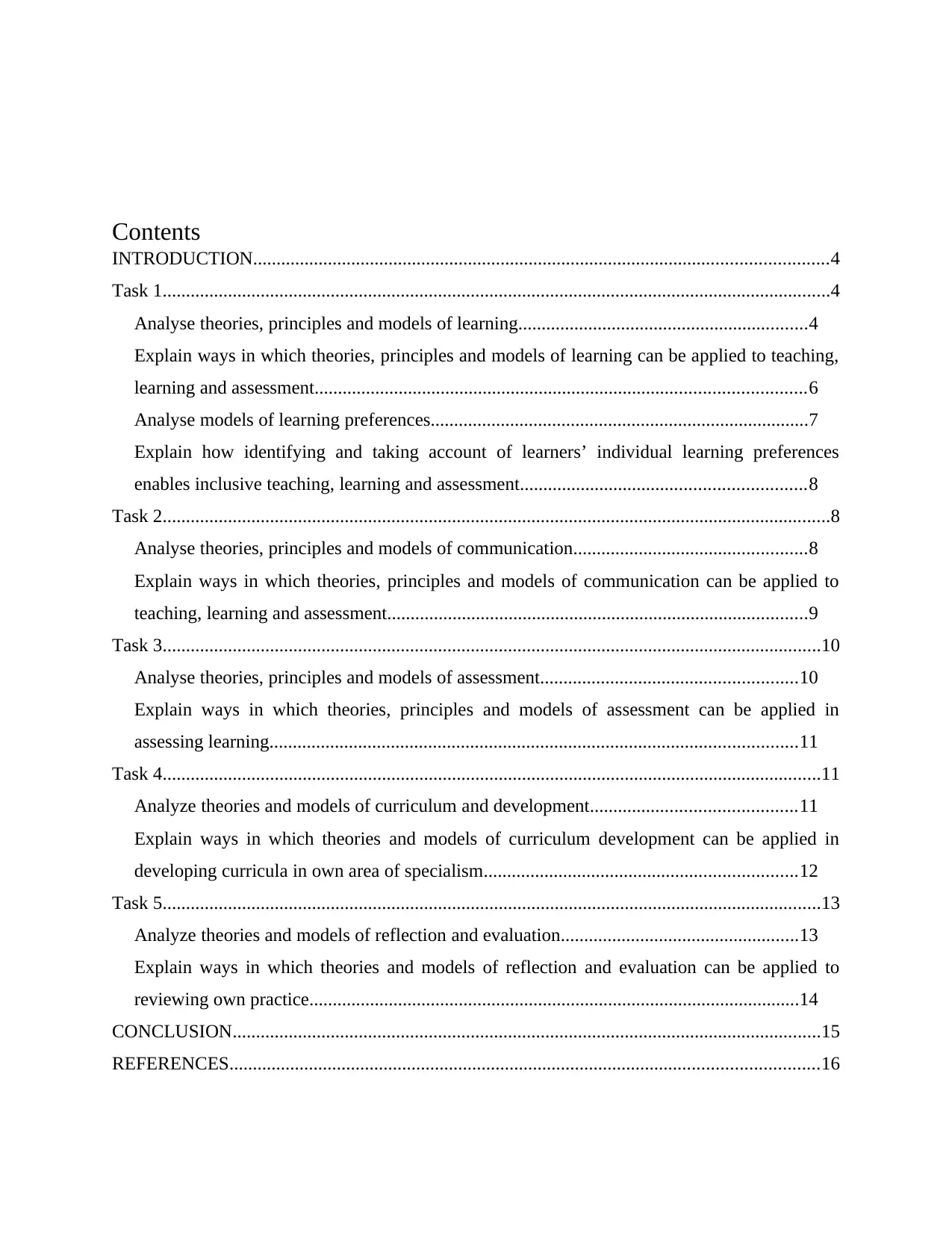
Contents
INTRODUCTION...........................................................................................................................4
Task 1...............................................................................................................................................4
Analyse theories, principles and models of learning..............................................................4
Explain ways in which theories, principles and models of learning can be applied to teaching,
learning and assessment.........................................................................................................6
Analyse models of learning preferences.................................................................................7
Explain how identifying and taking account of learners’ individual learning preferences
enables inclusive teaching, learning and assessment.............................................................8
Task 2...............................................................................................................................................8
Analyse theories, principles and models of communication..................................................8
Explain ways in which theories, principles and models of communication can be applied to
teaching, learning and assessment..........................................................................................9
Task 3.............................................................................................................................................10
Analyse theories, principles and models of assessment.......................................................10
Explain ways in which theories, principles and models of assessment can be applied in
assessing learning.................................................................................................................11
Task 4.............................................................................................................................................11
Analyze theories and models of curriculum and development............................................11
Explain ways in which theories and models of curriculum development can be applied in
developing curricula in own area of specialism...................................................................12
Task 5.............................................................................................................................................13
Analyze theories and models of reflection and evaluation...................................................13
Explain ways in which theories and models of reflection and evaluation can be applied to
reviewing own practice.........................................................................................................14
CONCLUSION..............................................................................................................................15
REFERENCES..............................................................................................................................16
INTRODUCTION...........................................................................................................................4
Task 1...............................................................................................................................................4
Analyse theories, principles and models of learning..............................................................4
Explain ways in which theories, principles and models of learning can be applied to teaching,
learning and assessment.........................................................................................................6
Analyse models of learning preferences.................................................................................7
Explain how identifying and taking account of learners’ individual learning preferences
enables inclusive teaching, learning and assessment.............................................................8
Task 2...............................................................................................................................................8
Analyse theories, principles and models of communication..................................................8
Explain ways in which theories, principles and models of communication can be applied to
teaching, learning and assessment..........................................................................................9
Task 3.............................................................................................................................................10
Analyse theories, principles and models of assessment.......................................................10
Explain ways in which theories, principles and models of assessment can be applied in
assessing learning.................................................................................................................11
Task 4.............................................................................................................................................11
Analyze theories and models of curriculum and development............................................11
Explain ways in which theories and models of curriculum development can be applied in
developing curricula in own area of specialism...................................................................12
Task 5.............................................................................................................................................13
Analyze theories and models of reflection and evaluation...................................................13
Explain ways in which theories and models of reflection and evaluation can be applied to
reviewing own practice.........................................................................................................14
CONCLUSION..............................................................................................................................15
REFERENCES..............................................................................................................................16
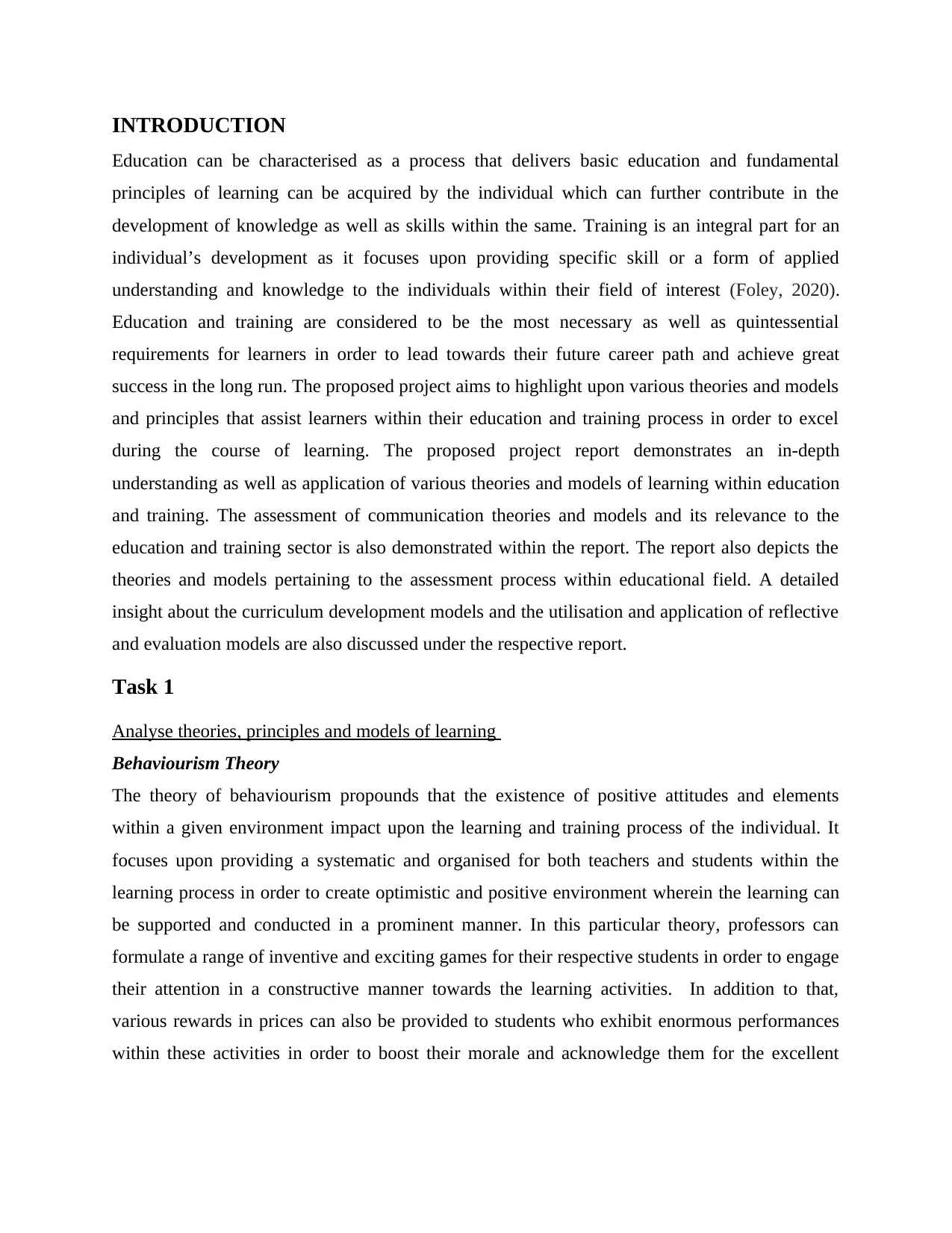
INTRODUCTION
Education can be characterised as a process that delivers basic education and fundamental
principles of learning can be acquired by the individual which can further contribute in the
development of knowledge as well as skills within the same. Training is an integral part for an
individual’s development as it focuses upon providing specific skill or a form of applied
understanding and knowledge to the individuals within their field of interest (Foley, 2020).
Education and training are considered to be the most necessary as well as quintessential
requirements for learners in order to lead towards their future career path and achieve great
success in the long run. The proposed project aims to highlight upon various theories and models
and principles that assist learners within their education and training process in order to excel
during the course of learning. The proposed project report demonstrates an in-depth
understanding as well as application of various theories and models of learning within education
and training. The assessment of communication theories and models and its relevance to the
education and training sector is also demonstrated within the report. The report also depicts the
theories and models pertaining to the assessment process within educational field. A detailed
insight about the curriculum development models and the utilisation and application of reflective
and evaluation models are also discussed under the respective report.
Task 1
Analyse theories, principles and models of learning
Behaviourism Theory
The theory of behaviourism propounds that the existence of positive attitudes and elements
within a given environment impact upon the learning and training process of the individual. It
focuses upon providing a systematic and organised for both teachers and students within the
learning process in order to create optimistic and positive environment wherein the learning can
be supported and conducted in a prominent manner. In this particular theory, professors can
formulate a range of inventive and exciting games for their respective students in order to engage
their attention in a constructive manner towards the learning activities. In addition to that,
various rewards in prices can also be provided to students who exhibit enormous performances
within these activities in order to boost their morale and acknowledge them for the excellent
Education can be characterised as a process that delivers basic education and fundamental
principles of learning can be acquired by the individual which can further contribute in the
development of knowledge as well as skills within the same. Training is an integral part for an
individual’s development as it focuses upon providing specific skill or a form of applied
understanding and knowledge to the individuals within their field of interest (Foley, 2020).
Education and training are considered to be the most necessary as well as quintessential
requirements for learners in order to lead towards their future career path and achieve great
success in the long run. The proposed project aims to highlight upon various theories and models
and principles that assist learners within their education and training process in order to excel
during the course of learning. The proposed project report demonstrates an in-depth
understanding as well as application of various theories and models of learning within education
and training. The assessment of communication theories and models and its relevance to the
education and training sector is also demonstrated within the report. The report also depicts the
theories and models pertaining to the assessment process within educational field. A detailed
insight about the curriculum development models and the utilisation and application of reflective
and evaluation models are also discussed under the respective report.
Task 1
Analyse theories, principles and models of learning
Behaviourism Theory
The theory of behaviourism propounds that the existence of positive attitudes and elements
within a given environment impact upon the learning and training process of the individual. It
focuses upon providing a systematic and organised for both teachers and students within the
learning process in order to create optimistic and positive environment wherein the learning can
be supported and conducted in a prominent manner. In this particular theory, professors can
formulate a range of inventive and exciting games for their respective students in order to engage
their attention in a constructive manner towards the learning activities. In addition to that,
various rewards in prices can also be provided to students who exhibit enormous performances
within these activities in order to boost their morale and acknowledge them for the excellent
⊘ This is a preview!⊘
Do you want full access?
Subscribe today to unlock all pages.

Trusted by 1+ million students worldwide
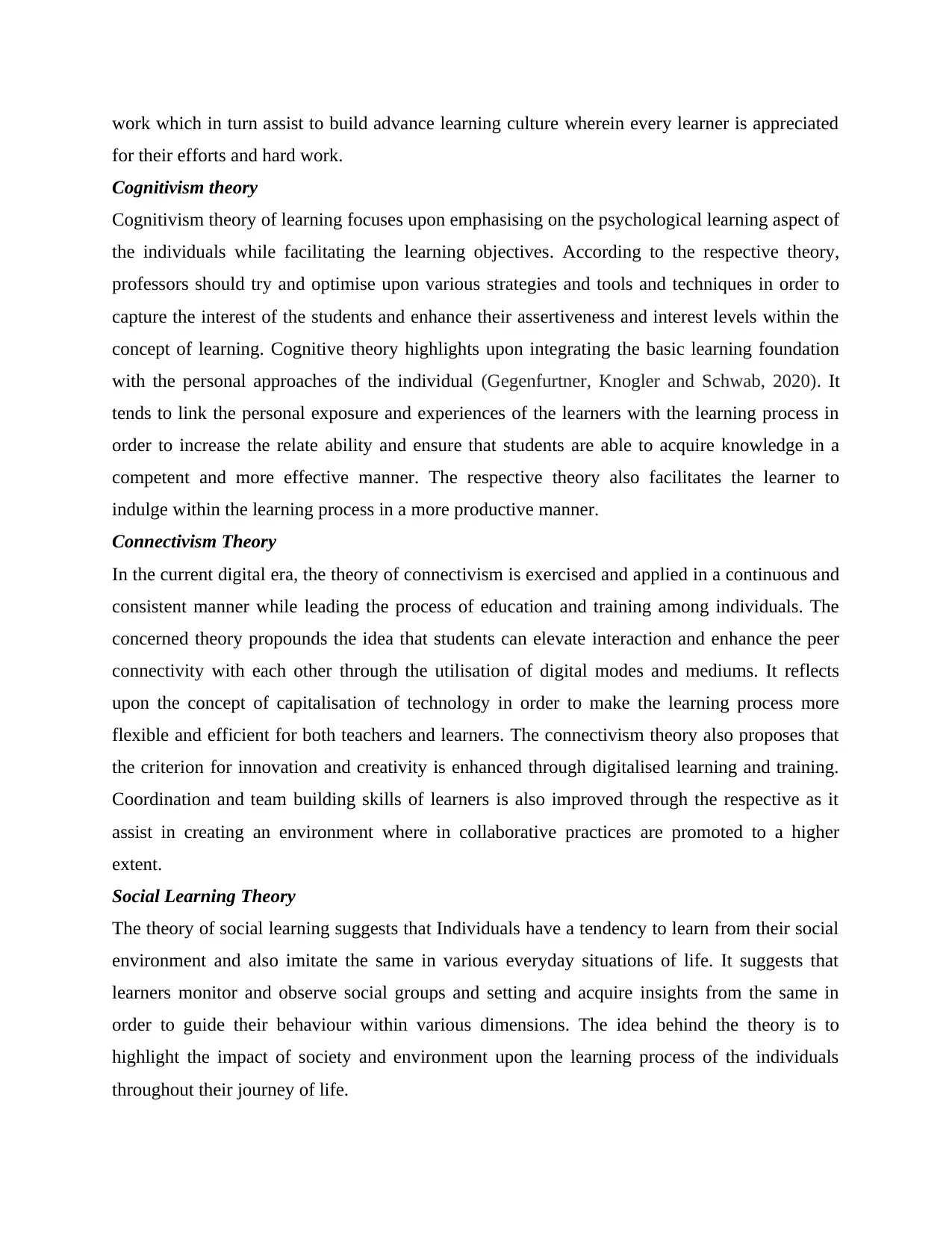
work which in turn assist to build advance learning culture wherein every learner is appreciated
for their efforts and hard work.
Cognitivism theory
Cognitivism theory of learning focuses upon emphasising on the psychological learning aspect of
the individuals while facilitating the learning objectives. According to the respective theory,
professors should try and optimise upon various strategies and tools and techniques in order to
capture the interest of the students and enhance their assertiveness and interest levels within the
concept of learning. Cognitive theory highlights upon integrating the basic learning foundation
with the personal approaches of the individual (Gegenfurtner, Knogler and Schwab, 2020). It
tends to link the personal exposure and experiences of the learners with the learning process in
order to increase the relate ability and ensure that students are able to acquire knowledge in a
competent and more effective manner. The respective theory also facilitates the learner to
indulge within the learning process in a more productive manner.
Connectivism Theory
In the current digital era, the theory of connectivism is exercised and applied in a continuous and
consistent manner while leading the process of education and training among individuals. The
concerned theory propounds the idea that students can elevate interaction and enhance the peer
connectivity with each other through the utilisation of digital modes and mediums. It reflects
upon the concept of capitalisation of technology in order to make the learning process more
flexible and efficient for both teachers and learners. The connectivism theory also proposes that
the criterion for innovation and creativity is enhanced through digitalised learning and training.
Coordination and team building skills of learners is also improved through the respective as it
assist in creating an environment where in collaborative practices are promoted to a higher
extent.
Social Learning Theory
The theory of social learning suggests that Individuals have a tendency to learn from their social
environment and also imitate the same in various everyday situations of life. It suggests that
learners monitor and observe social groups and setting and acquire insights from the same in
order to guide their behaviour within various dimensions. The idea behind the theory is to
highlight the impact of society and environment upon the learning process of the individuals
throughout their journey of life.
for their efforts and hard work.
Cognitivism theory
Cognitivism theory of learning focuses upon emphasising on the psychological learning aspect of
the individuals while facilitating the learning objectives. According to the respective theory,
professors should try and optimise upon various strategies and tools and techniques in order to
capture the interest of the students and enhance their assertiveness and interest levels within the
concept of learning. Cognitive theory highlights upon integrating the basic learning foundation
with the personal approaches of the individual (Gegenfurtner, Knogler and Schwab, 2020). It
tends to link the personal exposure and experiences of the learners with the learning process in
order to increase the relate ability and ensure that students are able to acquire knowledge in a
competent and more effective manner. The respective theory also facilitates the learner to
indulge within the learning process in a more productive manner.
Connectivism Theory
In the current digital era, the theory of connectivism is exercised and applied in a continuous and
consistent manner while leading the process of education and training among individuals. The
concerned theory propounds the idea that students can elevate interaction and enhance the peer
connectivity with each other through the utilisation of digital modes and mediums. It reflects
upon the concept of capitalisation of technology in order to make the learning process more
flexible and efficient for both teachers and learners. The connectivism theory also proposes that
the criterion for innovation and creativity is enhanced through digitalised learning and training.
Coordination and team building skills of learners is also improved through the respective as it
assist in creating an environment where in collaborative practices are promoted to a higher
extent.
Social Learning Theory
The theory of social learning suggests that Individuals have a tendency to learn from their social
environment and also imitate the same in various everyday situations of life. It suggests that
learners monitor and observe social groups and setting and acquire insights from the same in
order to guide their behaviour within various dimensions. The idea behind the theory is to
highlight the impact of society and environment upon the learning process of the individuals
throughout their journey of life.
Paraphrase This Document
Need a fresh take? Get an instant paraphrase of this document with our AI Paraphraser
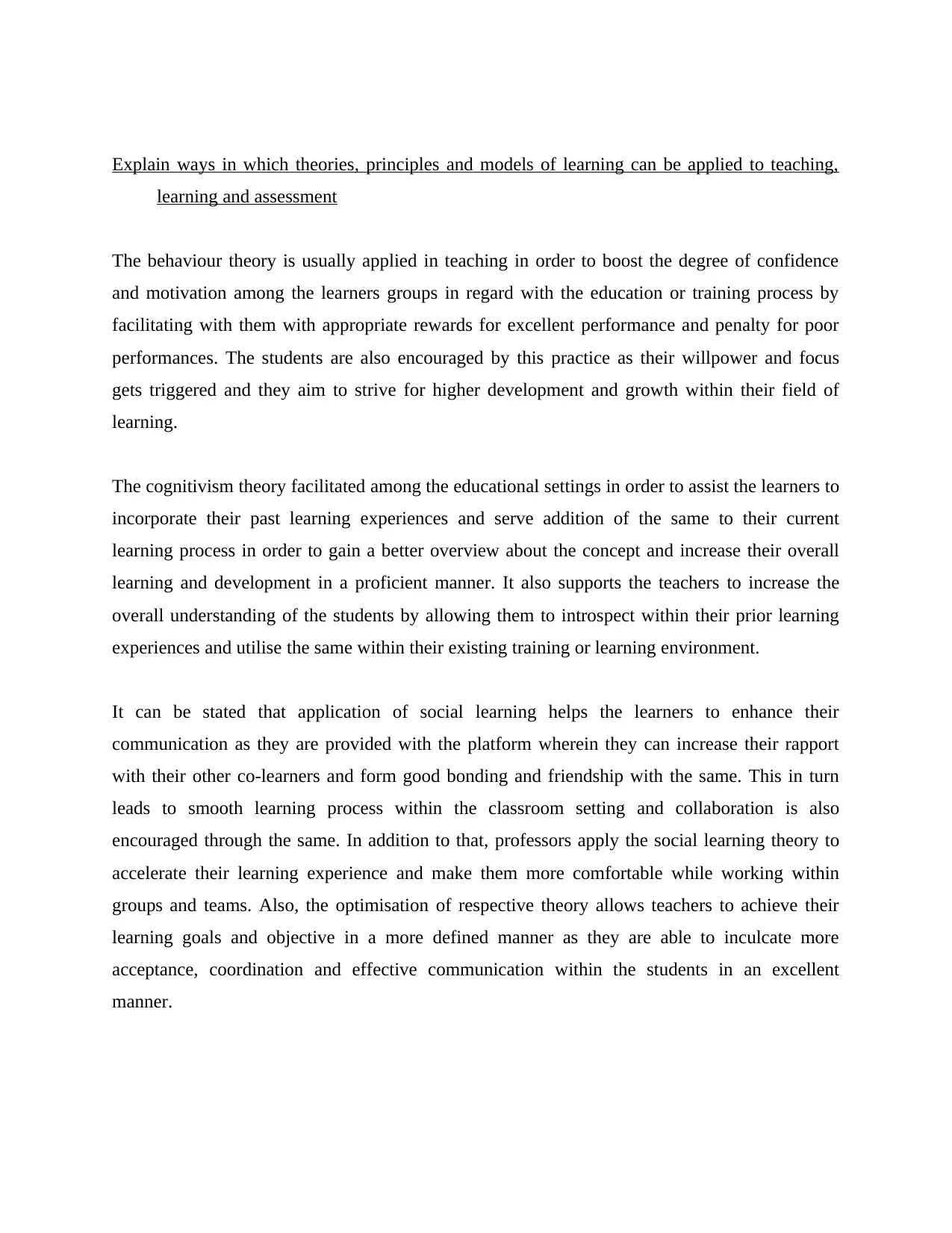
Explain ways in which theories, principles and models of learning can be applied to teaching,
learning and assessment
The behaviour theory is usually applied in teaching in order to boost the degree of confidence
and motivation among the learners groups in regard with the education or training process by
facilitating with them with appropriate rewards for excellent performance and penalty for poor
performances. The students are also encouraged by this practice as their willpower and focus
gets triggered and they aim to strive for higher development and growth within their field of
learning.
The cognitivism theory facilitated among the educational settings in order to assist the learners to
incorporate their past learning experiences and serve addition of the same to their current
learning process in order to gain a better overview about the concept and increase their overall
learning and development in a proficient manner. It also supports the teachers to increase the
overall understanding of the students by allowing them to introspect within their prior learning
experiences and utilise the same within their existing training or learning environment.
It can be stated that application of social learning helps the learners to enhance their
communication as they are provided with the platform wherein they can increase their rapport
with their other co-learners and form good bonding and friendship with the same. This in turn
leads to smooth learning process within the classroom setting and collaboration is also
encouraged through the same. In addition to that, professors apply the social learning theory to
accelerate their learning experience and make them more comfortable while working within
groups and teams. Also, the optimisation of respective theory allows teachers to achieve their
learning goals and objective in a more defined manner as they are able to inculcate more
acceptance, coordination and effective communication within the students in an excellent
manner.
learning and assessment
The behaviour theory is usually applied in teaching in order to boost the degree of confidence
and motivation among the learners groups in regard with the education or training process by
facilitating with them with appropriate rewards for excellent performance and penalty for poor
performances. The students are also encouraged by this practice as their willpower and focus
gets triggered and they aim to strive for higher development and growth within their field of
learning.
The cognitivism theory facilitated among the educational settings in order to assist the learners to
incorporate their past learning experiences and serve addition of the same to their current
learning process in order to gain a better overview about the concept and increase their overall
learning and development in a proficient manner. It also supports the teachers to increase the
overall understanding of the students by allowing them to introspect within their prior learning
experiences and utilise the same within their existing training or learning environment.
It can be stated that application of social learning helps the learners to enhance their
communication as they are provided with the platform wherein they can increase their rapport
with their other co-learners and form good bonding and friendship with the same. This in turn
leads to smooth learning process within the classroom setting and collaboration is also
encouraged through the same. In addition to that, professors apply the social learning theory to
accelerate their learning experience and make them more comfortable while working within
groups and teams. Also, the optimisation of respective theory allows teachers to achieve their
learning goals and objective in a more defined manner as they are able to inculcate more
acceptance, coordination and effective communication within the students in an excellent
manner.
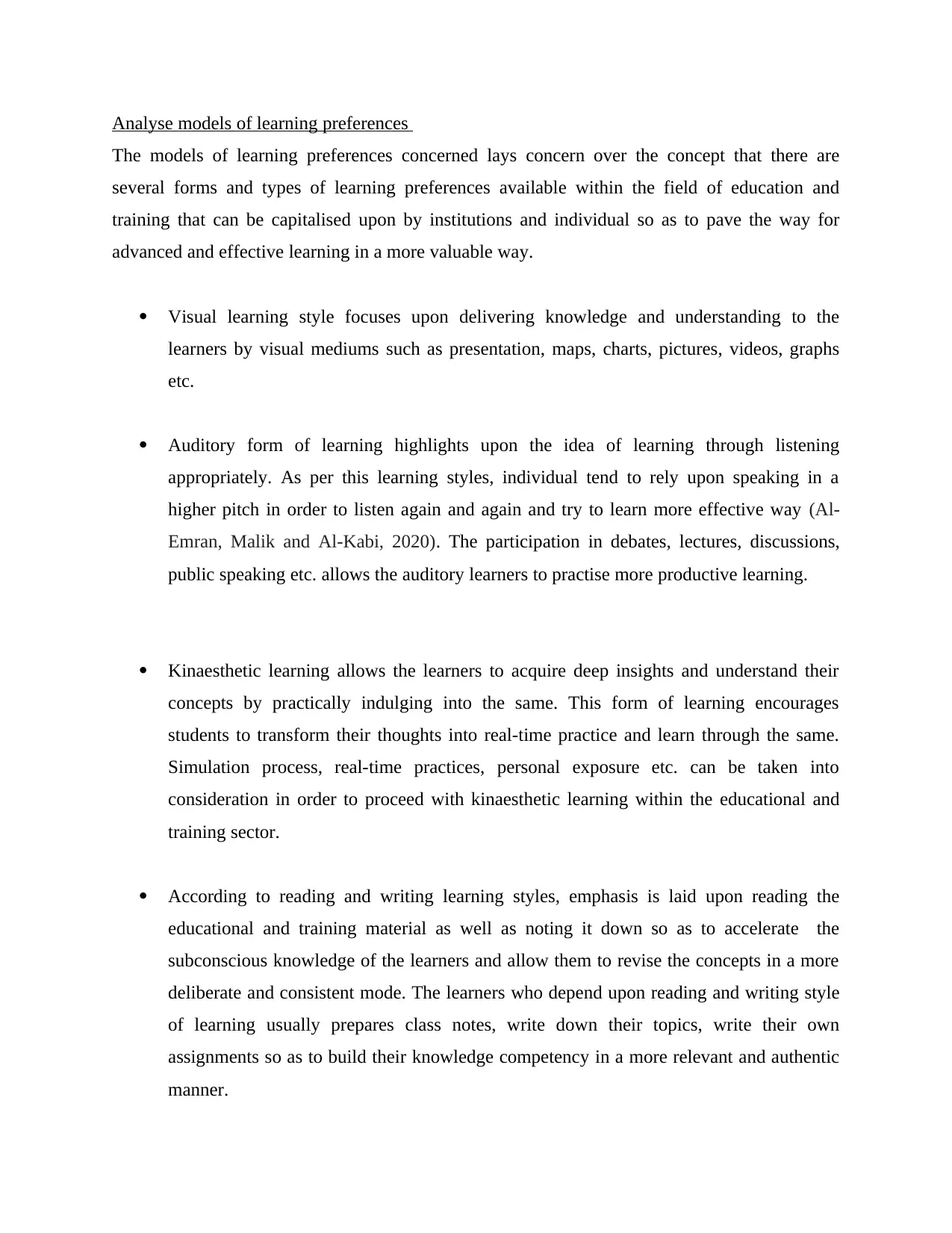
Analyse models of learning preferences
The models of learning preferences concerned lays concern over the concept that there are
several forms and types of learning preferences available within the field of education and
training that can be capitalised upon by institutions and individual so as to pave the way for
advanced and effective learning in a more valuable way.
Visual learning style focuses upon delivering knowledge and understanding to the
learners by visual mediums such as presentation, maps, charts, pictures, videos, graphs
etc.
Auditory form of learning highlights upon the idea of learning through listening
appropriately. As per this learning styles, individual tend to rely upon speaking in a
higher pitch in order to listen again and again and try to learn more effective way (Al-
Emran, Malik and Al-Kabi, 2020). The participation in debates, lectures, discussions,
public speaking etc. allows the auditory learners to practise more productive learning.
Kinaesthetic learning allows the learners to acquire deep insights and understand their
concepts by practically indulging into the same. This form of learning encourages
students to transform their thoughts into real-time practice and learn through the same.
Simulation process, real-time practices, personal exposure etc. can be taken into
consideration in order to proceed with kinaesthetic learning within the educational and
training sector.
According to reading and writing learning styles, emphasis is laid upon reading the
educational and training material as well as noting it down so as to accelerate the
subconscious knowledge of the learners and allow them to revise the concepts in a more
deliberate and consistent mode. The learners who depend upon reading and writing style
of learning usually prepares class notes, write down their topics, write their own
assignments so as to build their knowledge competency in a more relevant and authentic
manner.
The models of learning preferences concerned lays concern over the concept that there are
several forms and types of learning preferences available within the field of education and
training that can be capitalised upon by institutions and individual so as to pave the way for
advanced and effective learning in a more valuable way.
Visual learning style focuses upon delivering knowledge and understanding to the
learners by visual mediums such as presentation, maps, charts, pictures, videos, graphs
etc.
Auditory form of learning highlights upon the idea of learning through listening
appropriately. As per this learning styles, individual tend to rely upon speaking in a
higher pitch in order to listen again and again and try to learn more effective way (Al-
Emran, Malik and Al-Kabi, 2020). The participation in debates, lectures, discussions,
public speaking etc. allows the auditory learners to practise more productive learning.
Kinaesthetic learning allows the learners to acquire deep insights and understand their
concepts by practically indulging into the same. This form of learning encourages
students to transform their thoughts into real-time practice and learn through the same.
Simulation process, real-time practices, personal exposure etc. can be taken into
consideration in order to proceed with kinaesthetic learning within the educational and
training sector.
According to reading and writing learning styles, emphasis is laid upon reading the
educational and training material as well as noting it down so as to accelerate the
subconscious knowledge of the learners and allow them to revise the concepts in a more
deliberate and consistent mode. The learners who depend upon reading and writing style
of learning usually prepares class notes, write down their topics, write their own
assignments so as to build their knowledge competency in a more relevant and authentic
manner.
⊘ This is a preview!⊘
Do you want full access?
Subscribe today to unlock all pages.

Trusted by 1+ million students worldwide
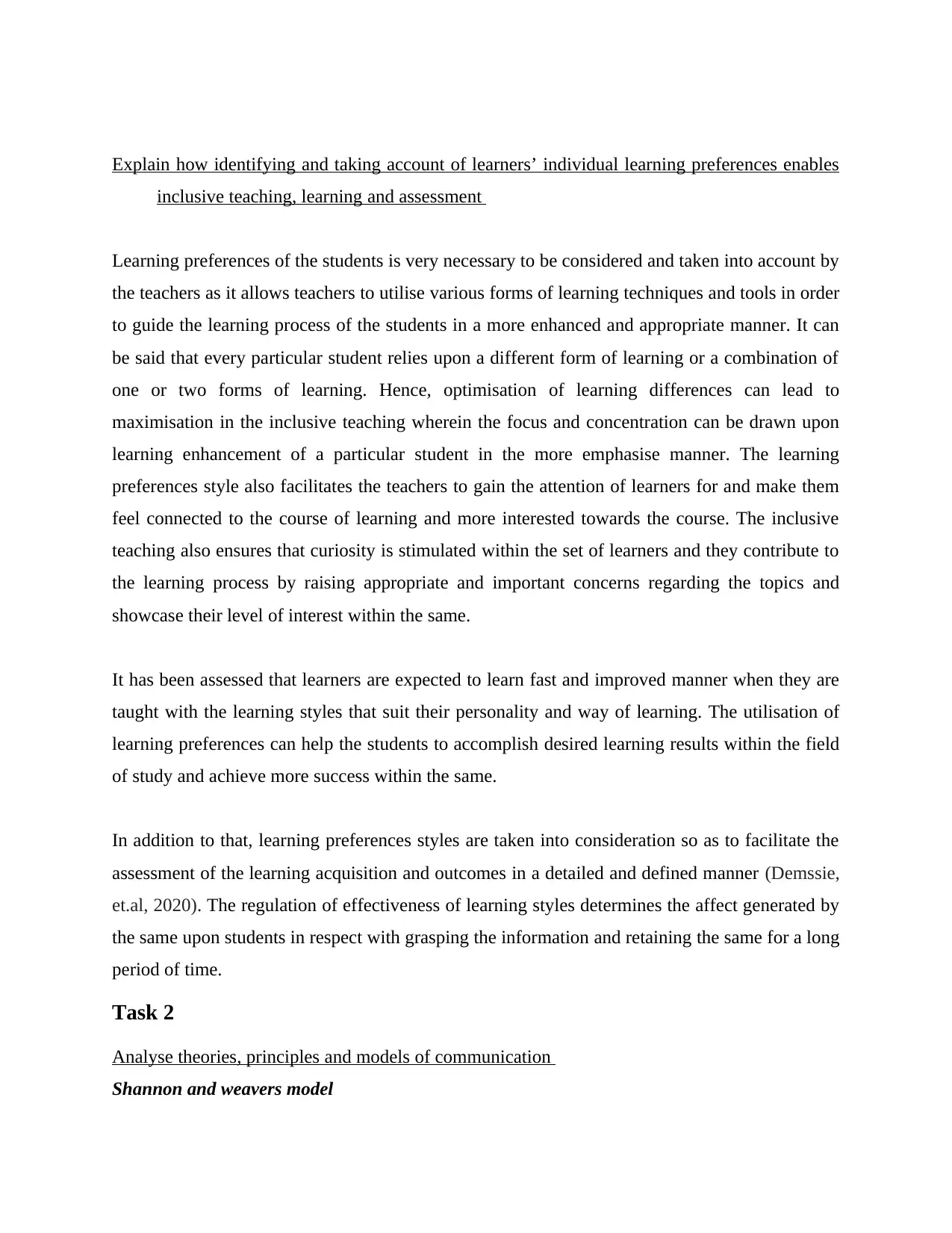
Explain how identifying and taking account of learners’ individual learning preferences enables
inclusive teaching, learning and assessment
Learning preferences of the students is very necessary to be considered and taken into account by
the teachers as it allows teachers to utilise various forms of learning techniques and tools in order
to guide the learning process of the students in a more enhanced and appropriate manner. It can
be said that every particular student relies upon a different form of learning or a combination of
one or two forms of learning. Hence, optimisation of learning differences can lead to
maximisation in the inclusive teaching wherein the focus and concentration can be drawn upon
learning enhancement of a particular student in the more emphasise manner. The learning
preferences style also facilitates the teachers to gain the attention of learners for and make them
feel connected to the course of learning and more interested towards the course. The inclusive
teaching also ensures that curiosity is stimulated within the set of learners and they contribute to
the learning process by raising appropriate and important concerns regarding the topics and
showcase their level of interest within the same.
It has been assessed that learners are expected to learn fast and improved manner when they are
taught with the learning styles that suit their personality and way of learning. The utilisation of
learning preferences can help the students to accomplish desired learning results within the field
of study and achieve more success within the same.
In addition to that, learning preferences styles are taken into consideration so as to facilitate the
assessment of the learning acquisition and outcomes in a detailed and defined manner (Demssie,
et.al, 2020). The regulation of effectiveness of learning styles determines the affect generated by
the same upon students in respect with grasping the information and retaining the same for a long
period of time.
Task 2
Analyse theories, principles and models of communication
Shannon and weavers model
inclusive teaching, learning and assessment
Learning preferences of the students is very necessary to be considered and taken into account by
the teachers as it allows teachers to utilise various forms of learning techniques and tools in order
to guide the learning process of the students in a more enhanced and appropriate manner. It can
be said that every particular student relies upon a different form of learning or a combination of
one or two forms of learning. Hence, optimisation of learning differences can lead to
maximisation in the inclusive teaching wherein the focus and concentration can be drawn upon
learning enhancement of a particular student in the more emphasise manner. The learning
preferences style also facilitates the teachers to gain the attention of learners for and make them
feel connected to the course of learning and more interested towards the course. The inclusive
teaching also ensures that curiosity is stimulated within the set of learners and they contribute to
the learning process by raising appropriate and important concerns regarding the topics and
showcase their level of interest within the same.
It has been assessed that learners are expected to learn fast and improved manner when they are
taught with the learning styles that suit their personality and way of learning. The utilisation of
learning preferences can help the students to accomplish desired learning results within the field
of study and achieve more success within the same.
In addition to that, learning preferences styles are taken into consideration so as to facilitate the
assessment of the learning acquisition and outcomes in a detailed and defined manner (Demssie,
et.al, 2020). The regulation of effectiveness of learning styles determines the affect generated by
the same upon students in respect with grasping the information and retaining the same for a long
period of time.
Task 2
Analyse theories, principles and models of communication
Shannon and weavers model
Paraphrase This Document
Need a fresh take? Get an instant paraphrase of this document with our AI Paraphraser
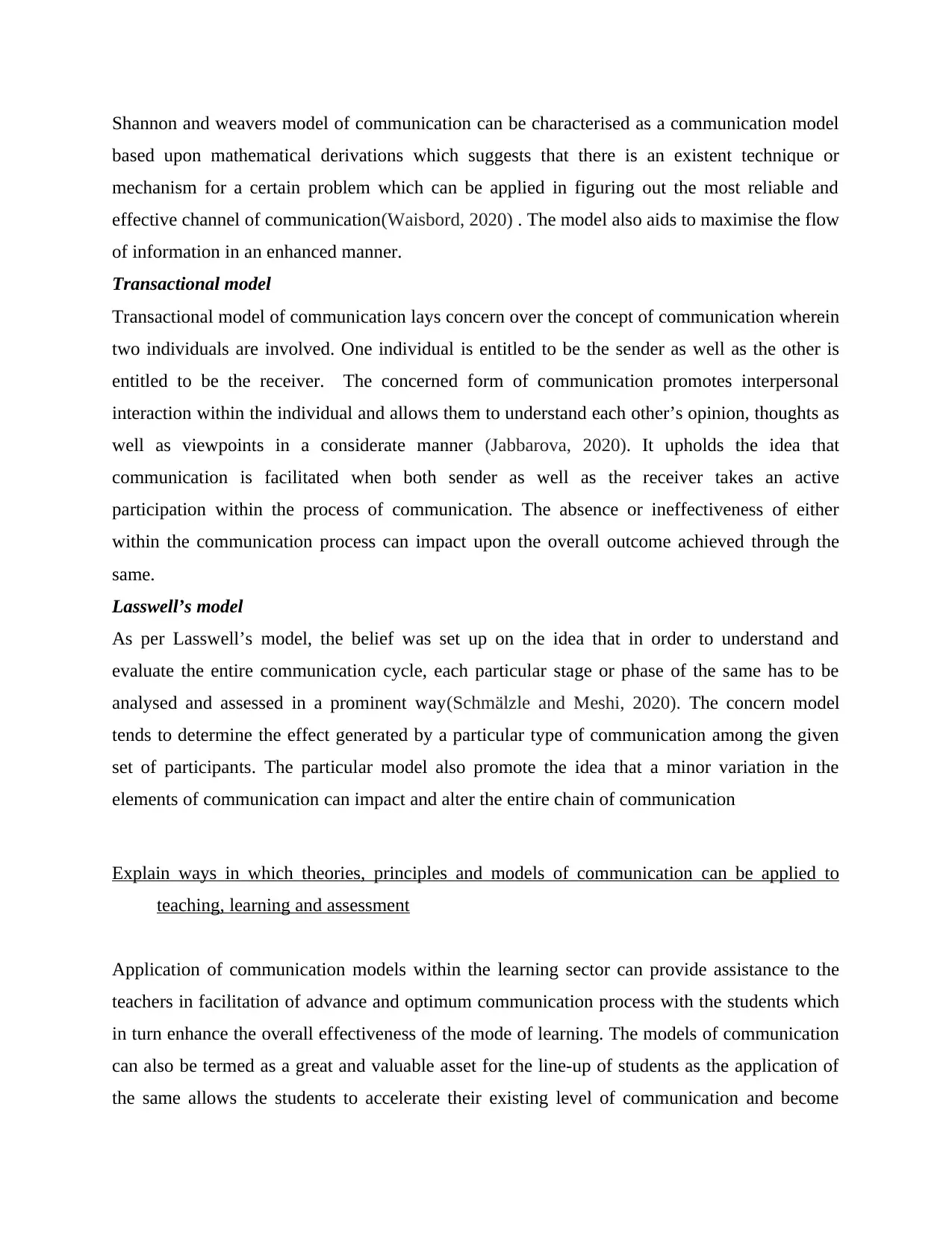
Shannon and weavers model of communication can be characterised as a communication model
based upon mathematical derivations which suggests that there is an existent technique or
mechanism for a certain problem which can be applied in figuring out the most reliable and
effective channel of communication(Waisbord, 2020) . The model also aids to maximise the flow
of information in an enhanced manner.
Transactional model
Transactional model of communication lays concern over the concept of communication wherein
two individuals are involved. One individual is entitled to be the sender as well as the other is
entitled to be the receiver. The concerned form of communication promotes interpersonal
interaction within the individual and allows them to understand each other’s opinion, thoughts as
well as viewpoints in a considerate manner (Jabbarova, 2020). It upholds the idea that
communication is facilitated when both sender as well as the receiver takes an active
participation within the process of communication. The absence or ineffectiveness of either
within the communication process can impact upon the overall outcome achieved through the
same.
Lasswell’s model
As per Lasswell’s model, the belief was set up on the idea that in order to understand and
evaluate the entire communication cycle, each particular stage or phase of the same has to be
analysed and assessed in a prominent way(Schmälzle and Meshi, 2020). The concern model
tends to determine the effect generated by a particular type of communication among the given
set of participants. The particular model also promote the idea that a minor variation in the
elements of communication can impact and alter the entire chain of communication
Explain ways in which theories, principles and models of communication can be applied to
teaching, learning and assessment
Application of communication models within the learning sector can provide assistance to the
teachers in facilitation of advance and optimum communication process with the students which
in turn enhance the overall effectiveness of the mode of learning. The models of communication
can also be termed as a great and valuable asset for the line-up of students as the application of
the same allows the students to accelerate their existing level of communication and become
based upon mathematical derivations which suggests that there is an existent technique or
mechanism for a certain problem which can be applied in figuring out the most reliable and
effective channel of communication(Waisbord, 2020) . The model also aids to maximise the flow
of information in an enhanced manner.
Transactional model
Transactional model of communication lays concern over the concept of communication wherein
two individuals are involved. One individual is entitled to be the sender as well as the other is
entitled to be the receiver. The concerned form of communication promotes interpersonal
interaction within the individual and allows them to understand each other’s opinion, thoughts as
well as viewpoints in a considerate manner (Jabbarova, 2020). It upholds the idea that
communication is facilitated when both sender as well as the receiver takes an active
participation within the process of communication. The absence or ineffectiveness of either
within the communication process can impact upon the overall outcome achieved through the
same.
Lasswell’s model
As per Lasswell’s model, the belief was set up on the idea that in order to understand and
evaluate the entire communication cycle, each particular stage or phase of the same has to be
analysed and assessed in a prominent way(Schmälzle and Meshi, 2020). The concern model
tends to determine the effect generated by a particular type of communication among the given
set of participants. The particular model also promote the idea that a minor variation in the
elements of communication can impact and alter the entire chain of communication
Explain ways in which theories, principles and models of communication can be applied to
teaching, learning and assessment
Application of communication models within the learning sector can provide assistance to the
teachers in facilitation of advance and optimum communication process with the students which
in turn enhance the overall effectiveness of the mode of learning. The models of communication
can also be termed as a great and valuable asset for the line-up of students as the application of
the same allows the students to accelerate their existing level of communication and become
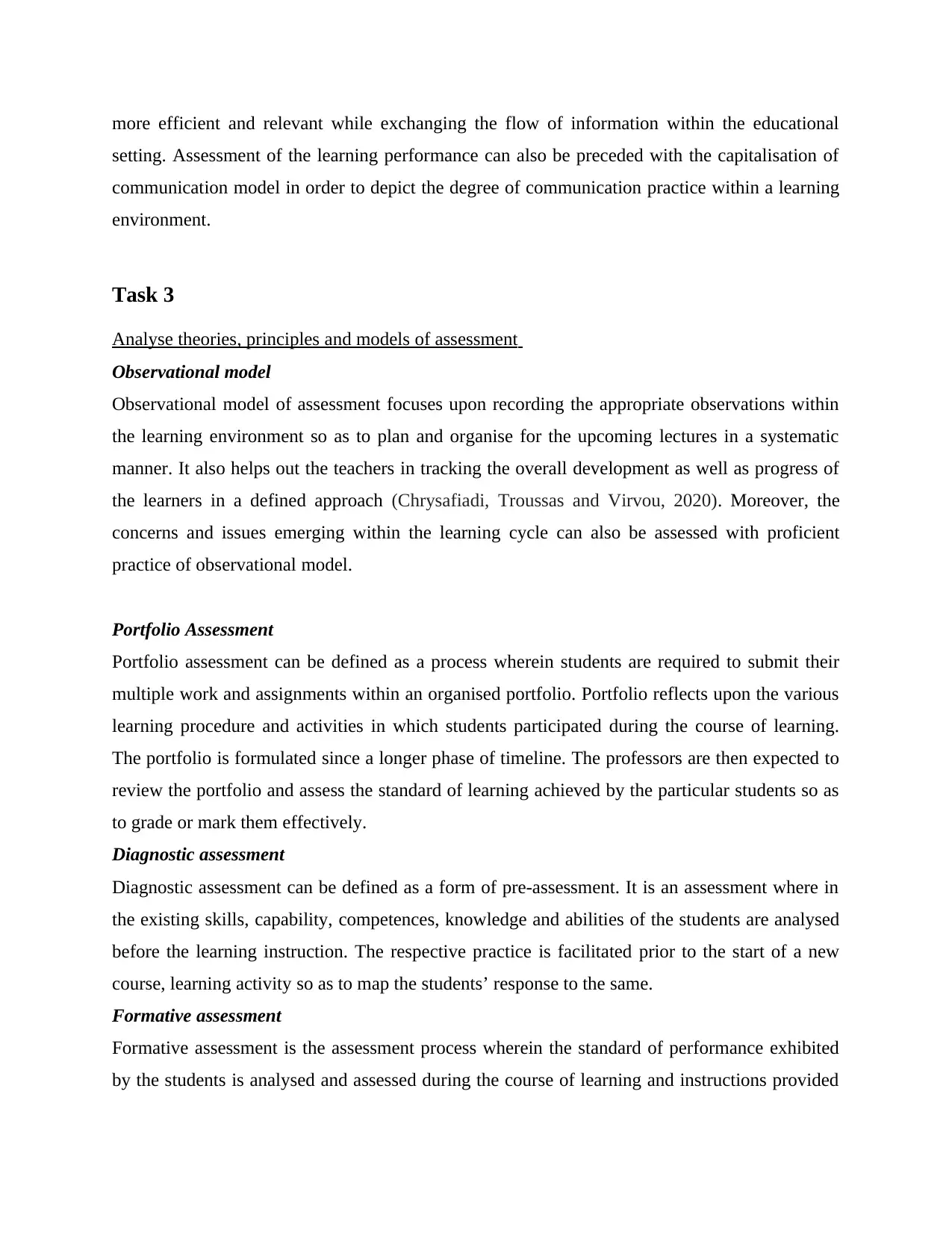
more efficient and relevant while exchanging the flow of information within the educational
setting. Assessment of the learning performance can also be preceded with the capitalisation of
communication model in order to depict the degree of communication practice within a learning
environment.
Task 3
Analyse theories, principles and models of assessment
Observational model
Observational model of assessment focuses upon recording the appropriate observations within
the learning environment so as to plan and organise for the upcoming lectures in a systematic
manner. It also helps out the teachers in tracking the overall development as well as progress of
the learners in a defined approach (Chrysafiadi, Troussas and Virvou, 2020). Moreover, the
concerns and issues emerging within the learning cycle can also be assessed with proficient
practice of observational model.
Portfolio Assessment
Portfolio assessment can be defined as a process wherein students are required to submit their
multiple work and assignments within an organised portfolio. Portfolio reflects upon the various
learning procedure and activities in which students participated during the course of learning.
The portfolio is formulated since a longer phase of timeline. The professors are then expected to
review the portfolio and assess the standard of learning achieved by the particular students so as
to grade or mark them effectively.
Diagnostic assessment
Diagnostic assessment can be defined as a form of pre-assessment. It is an assessment where in
the existing skills, capability, competences, knowledge and abilities of the students are analysed
before the learning instruction. The respective practice is facilitated prior to the start of a new
course, learning activity so as to map the students’ response to the same.
Formative assessment
Formative assessment is the assessment process wherein the standard of performance exhibited
by the students is analysed and assessed during the course of learning and instructions provided
setting. Assessment of the learning performance can also be preceded with the capitalisation of
communication model in order to depict the degree of communication practice within a learning
environment.
Task 3
Analyse theories, principles and models of assessment
Observational model
Observational model of assessment focuses upon recording the appropriate observations within
the learning environment so as to plan and organise for the upcoming lectures in a systematic
manner. It also helps out the teachers in tracking the overall development as well as progress of
the learners in a defined approach (Chrysafiadi, Troussas and Virvou, 2020). Moreover, the
concerns and issues emerging within the learning cycle can also be assessed with proficient
practice of observational model.
Portfolio Assessment
Portfolio assessment can be defined as a process wherein students are required to submit their
multiple work and assignments within an organised portfolio. Portfolio reflects upon the various
learning procedure and activities in which students participated during the course of learning.
The portfolio is formulated since a longer phase of timeline. The professors are then expected to
review the portfolio and assess the standard of learning achieved by the particular students so as
to grade or mark them effectively.
Diagnostic assessment
Diagnostic assessment can be defined as a form of pre-assessment. It is an assessment where in
the existing skills, capability, competences, knowledge and abilities of the students are analysed
before the learning instruction. The respective practice is facilitated prior to the start of a new
course, learning activity so as to map the students’ response to the same.
Formative assessment
Formative assessment is the assessment process wherein the standard of performance exhibited
by the students is analysed and assessed during the course of learning and instructions provided
⊘ This is a preview!⊘
Do you want full access?
Subscribe today to unlock all pages.

Trusted by 1+ million students worldwide
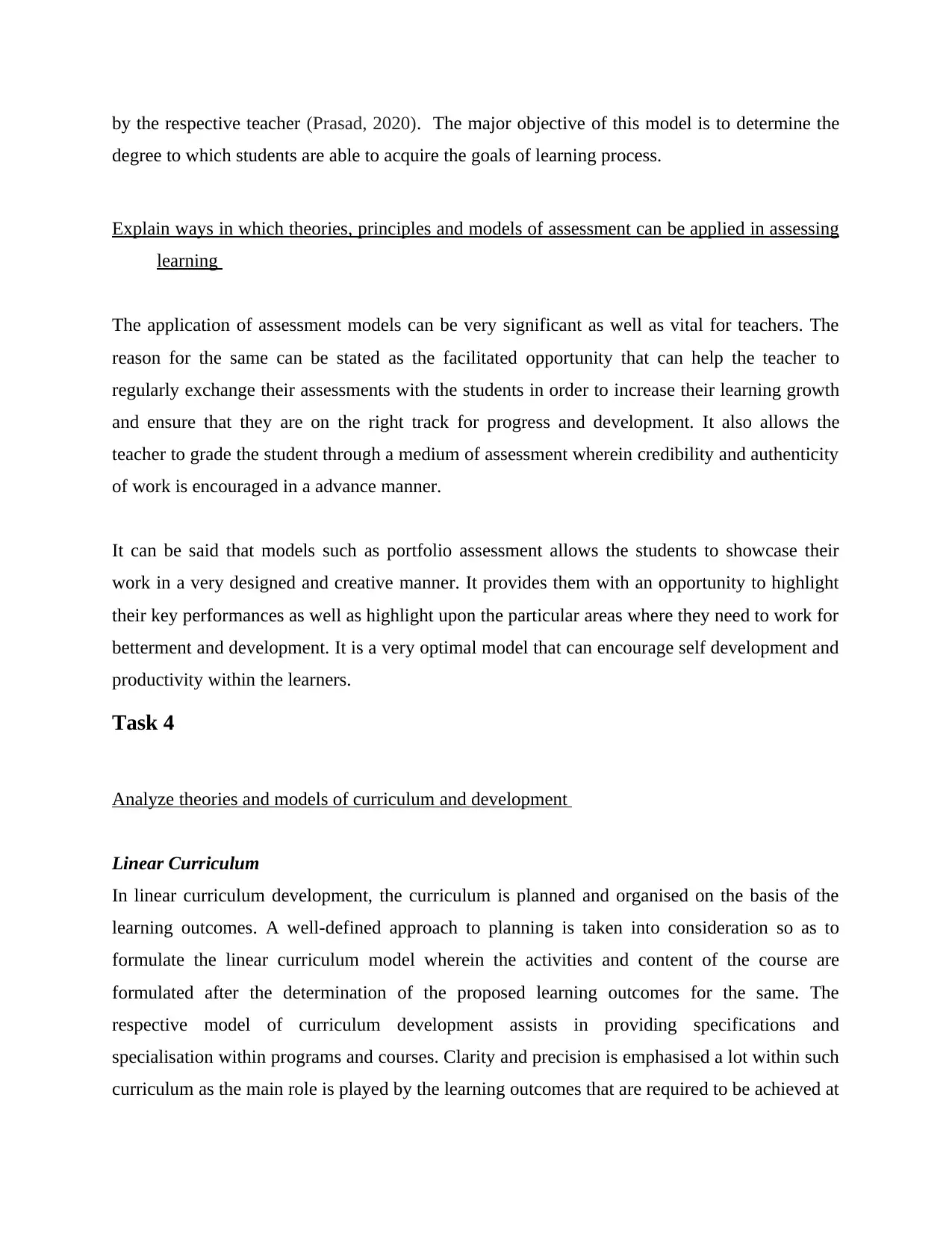
by the respective teacher (Prasad, 2020). The major objective of this model is to determine the
degree to which students are able to acquire the goals of learning process.
Explain ways in which theories, principles and models of assessment can be applied in assessing
learning
The application of assessment models can be very significant as well as vital for teachers. The
reason for the same can be stated as the facilitated opportunity that can help the teacher to
regularly exchange their assessments with the students in order to increase their learning growth
and ensure that they are on the right track for progress and development. It also allows the
teacher to grade the student through a medium of assessment wherein credibility and authenticity
of work is encouraged in a advance manner.
It can be said that models such as portfolio assessment allows the students to showcase their
work in a very designed and creative manner. It provides them with an opportunity to highlight
their key performances as well as highlight upon the particular areas where they need to work for
betterment and development. It is a very optimal model that can encourage self development and
productivity within the learners.
Task 4
Analyze theories and models of curriculum and development
Linear Curriculum
In linear curriculum development, the curriculum is planned and organised on the basis of the
learning outcomes. A well-defined approach to planning is taken into consideration so as to
formulate the linear curriculum model wherein the activities and content of the course are
formulated after the determination of the proposed learning outcomes for the same. The
respective model of curriculum development assists in providing specifications and
specialisation within programs and courses. Clarity and precision is emphasised a lot within such
curriculum as the main role is played by the learning outcomes that are required to be achieved at
degree to which students are able to acquire the goals of learning process.
Explain ways in which theories, principles and models of assessment can be applied in assessing
learning
The application of assessment models can be very significant as well as vital for teachers. The
reason for the same can be stated as the facilitated opportunity that can help the teacher to
regularly exchange their assessments with the students in order to increase their learning growth
and ensure that they are on the right track for progress and development. It also allows the
teacher to grade the student through a medium of assessment wherein credibility and authenticity
of work is encouraged in a advance manner.
It can be said that models such as portfolio assessment allows the students to showcase their
work in a very designed and creative manner. It provides them with an opportunity to highlight
their key performances as well as highlight upon the particular areas where they need to work for
betterment and development. It is a very optimal model that can encourage self development and
productivity within the learners.
Task 4
Analyze theories and models of curriculum and development
Linear Curriculum
In linear curriculum development, the curriculum is planned and organised on the basis of the
learning outcomes. A well-defined approach to planning is taken into consideration so as to
formulate the linear curriculum model wherein the activities and content of the course are
formulated after the determination of the proposed learning outcomes for the same. The
respective model of curriculum development assists in providing specifications and
specialisation within programs and courses. Clarity and precision is emphasised a lot within such
curriculum as the main role is played by the learning outcomes that are required to be achieved at
Paraphrase This Document
Need a fresh take? Get an instant paraphrase of this document with our AI Paraphraser
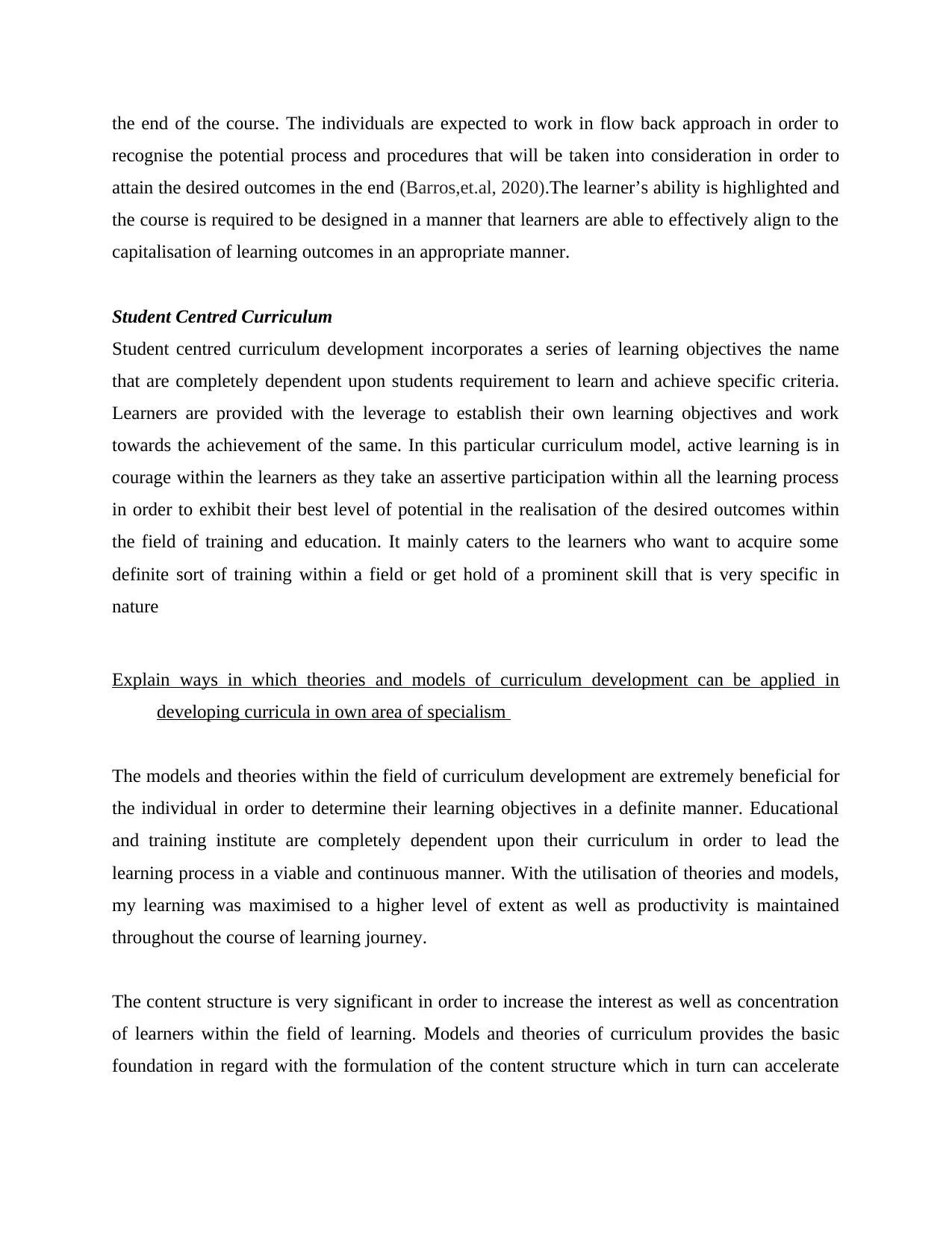
the end of the course. The individuals are expected to work in flow back approach in order to
recognise the potential process and procedures that will be taken into consideration in order to
attain the desired outcomes in the end (Barros,et.al, 2020).The learner’s ability is highlighted and
the course is required to be designed in a manner that learners are able to effectively align to the
capitalisation of learning outcomes in an appropriate manner.
Student Centred Curriculum
Student centred curriculum development incorporates a series of learning objectives the name
that are completely dependent upon students requirement to learn and achieve specific criteria.
Learners are provided with the leverage to establish their own learning objectives and work
towards the achievement of the same. In this particular curriculum model, active learning is in
courage within the learners as they take an assertive participation within all the learning process
in order to exhibit their best level of potential in the realisation of the desired outcomes within
the field of training and education. It mainly caters to the learners who want to acquire some
definite sort of training within a field or get hold of a prominent skill that is very specific in
nature
Explain ways in which theories and models of curriculum development can be applied in
developing curricula in own area of specialism
The models and theories within the field of curriculum development are extremely beneficial for
the individual in order to determine their learning objectives in a definite manner. Educational
and training institute are completely dependent upon their curriculum in order to lead the
learning process in a viable and continuous manner. With the utilisation of theories and models,
my learning was maximised to a higher level of extent as well as productivity is maintained
throughout the course of learning journey.
The content structure is very significant in order to increase the interest as well as concentration
of learners within the field of learning. Models and theories of curriculum provides the basic
foundation in regard with the formulation of the content structure which in turn can accelerate
recognise the potential process and procedures that will be taken into consideration in order to
attain the desired outcomes in the end (Barros,et.al, 2020).The learner’s ability is highlighted and
the course is required to be designed in a manner that learners are able to effectively align to the
capitalisation of learning outcomes in an appropriate manner.
Student Centred Curriculum
Student centred curriculum development incorporates a series of learning objectives the name
that are completely dependent upon students requirement to learn and achieve specific criteria.
Learners are provided with the leverage to establish their own learning objectives and work
towards the achievement of the same. In this particular curriculum model, active learning is in
courage within the learners as they take an assertive participation within all the learning process
in order to exhibit their best level of potential in the realisation of the desired outcomes within
the field of training and education. It mainly caters to the learners who want to acquire some
definite sort of training within a field or get hold of a prominent skill that is very specific in
nature
Explain ways in which theories and models of curriculum development can be applied in
developing curricula in own area of specialism
The models and theories within the field of curriculum development are extremely beneficial for
the individual in order to determine their learning objectives in a definite manner. Educational
and training institute are completely dependent upon their curriculum in order to lead the
learning process in a viable and continuous manner. With the utilisation of theories and models,
my learning was maximised to a higher level of extent as well as productivity is maintained
throughout the course of learning journey.
The content structure is very significant in order to increase the interest as well as concentration
of learners within the field of learning. Models and theories of curriculum provides the basic
foundation in regard with the formulation of the content structure which in turn can accelerate
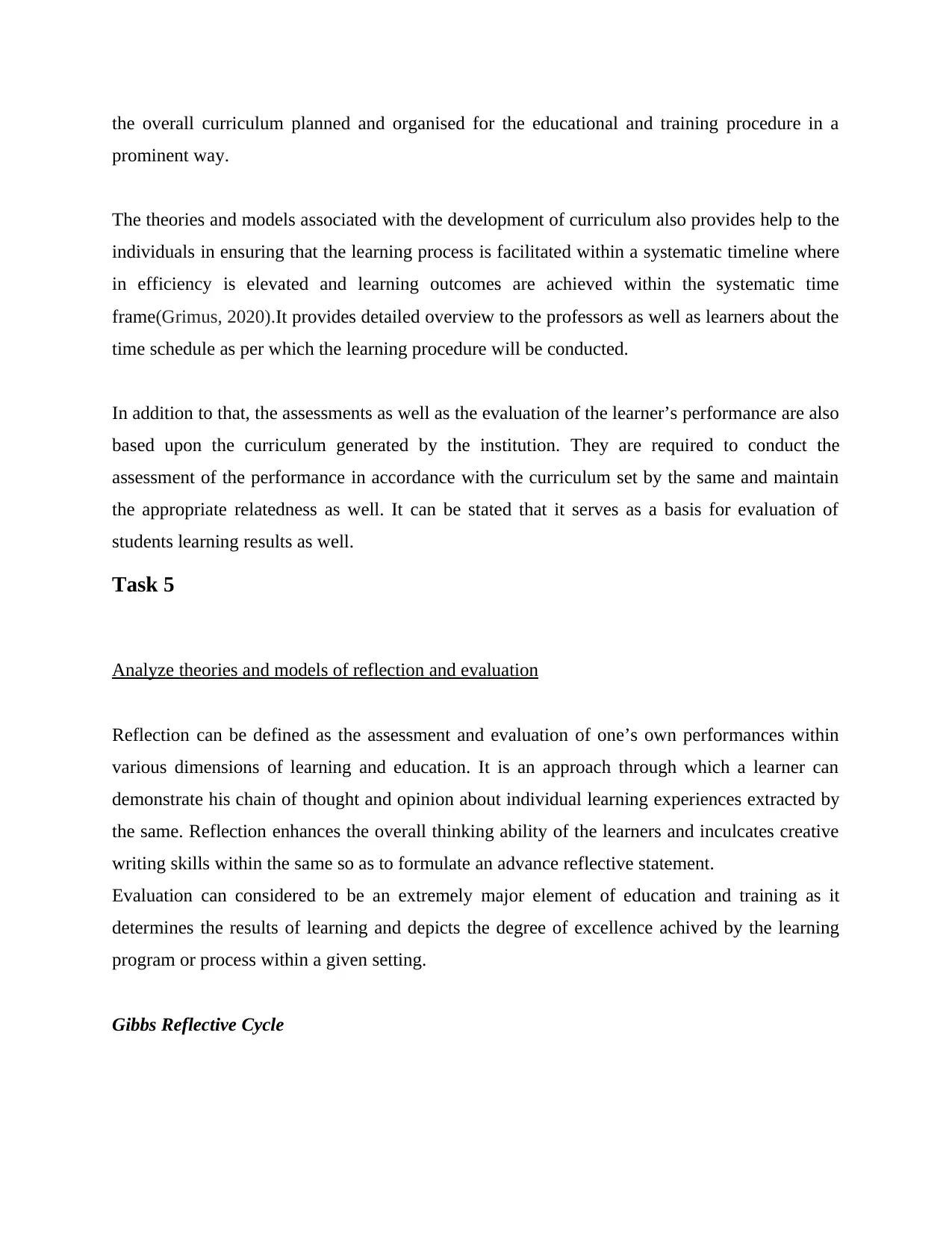
the overall curriculum planned and organised for the educational and training procedure in a
prominent way.
The theories and models associated with the development of curriculum also provides help to the
individuals in ensuring that the learning process is facilitated within a systematic timeline where
in efficiency is elevated and learning outcomes are achieved within the systematic time
frame(Grimus, 2020).It provides detailed overview to the professors as well as learners about the
time schedule as per which the learning procedure will be conducted.
In addition to that, the assessments as well as the evaluation of the learner’s performance are also
based upon the curriculum generated by the institution. They are required to conduct the
assessment of the performance in accordance with the curriculum set by the same and maintain
the appropriate relatedness as well. It can be stated that it serves as a basis for evaluation of
students learning results as well.
Task 5
Analyze theories and models of reflection and evaluation
Reflection can be defined as the assessment and evaluation of one’s own performances within
various dimensions of learning and education. It is an approach through which a learner can
demonstrate his chain of thought and opinion about individual learning experiences extracted by
the same. Reflection enhances the overall thinking ability of the learners and inculcates creative
writing skills within the same so as to formulate an advance reflective statement.
Evaluation can considered to be an extremely major element of education and training as it
determines the results of learning and depicts the degree of excellence achived by the learning
program or process within a given setting.
Gibbs Reflective Cycle
prominent way.
The theories and models associated with the development of curriculum also provides help to the
individuals in ensuring that the learning process is facilitated within a systematic timeline where
in efficiency is elevated and learning outcomes are achieved within the systematic time
frame(Grimus, 2020).It provides detailed overview to the professors as well as learners about the
time schedule as per which the learning procedure will be conducted.
In addition to that, the assessments as well as the evaluation of the learner’s performance are also
based upon the curriculum generated by the institution. They are required to conduct the
assessment of the performance in accordance with the curriculum set by the same and maintain
the appropriate relatedness as well. It can be stated that it serves as a basis for evaluation of
students learning results as well.
Task 5
Analyze theories and models of reflection and evaluation
Reflection can be defined as the assessment and evaluation of one’s own performances within
various dimensions of learning and education. It is an approach through which a learner can
demonstrate his chain of thought and opinion about individual learning experiences extracted by
the same. Reflection enhances the overall thinking ability of the learners and inculcates creative
writing skills within the same so as to formulate an advance reflective statement.
Evaluation can considered to be an extremely major element of education and training as it
determines the results of learning and depicts the degree of excellence achived by the learning
program or process within a given setting.
Gibbs Reflective Cycle
⊘ This is a preview!⊘
Do you want full access?
Subscribe today to unlock all pages.

Trusted by 1+ million students worldwide
1 out of 15
Related Documents
Your All-in-One AI-Powered Toolkit for Academic Success.
+13062052269
info@desklib.com
Available 24*7 on WhatsApp / Email
![[object Object]](/_next/static/media/star-bottom.7253800d.svg)
Unlock your academic potential
Copyright © 2020–2026 A2Z Services. All Rights Reserved. Developed and managed by ZUCOL.

